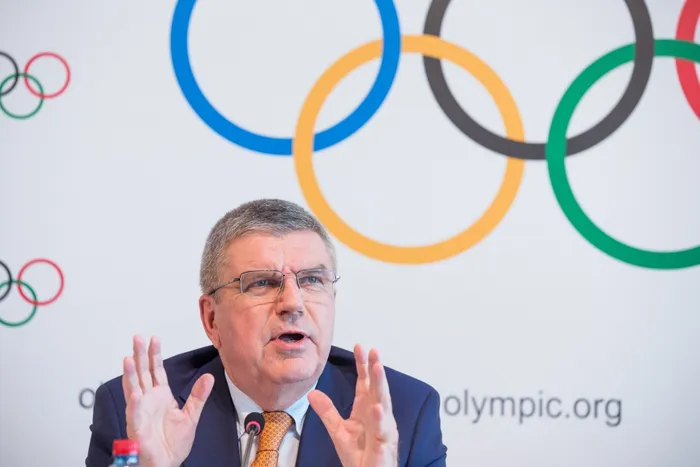Games in 2021 will need 'sacrifices' says Bach as IOC seeks new date

The Tokyo Olympics in 2021 will need "sacrifices" as the International Olympic Committee (IOC) aims to find a suitable date next year as soon as possible, its president, Thomas Bach, said Wednesday. Photo: IANS The Tokyo Olympics in 2021 will need "sacrifices" as the International Olympic Committee (IOC) aims to find a suitable date next year as soon as possible, its president, Thomas Bach, said Wednesday. Photo: IANS
BERLIN – The Tokyo Olympics in 2021 will need "sacrifices" as
the International Olympic Committee (IOC) aims to find a suitable
date next year as soon as possible, its president, Thomas Bach, said
Wednesday.
In a telephone press conference, Bach repeated a video message to
athletes in which he said an Olympics in 2021 could be "a celebration
of humanity" if the coronavirus pandemic has been overcome by then.
A task force, called "Here We Go" and comprising the Tokyo organizers
and an IOC coordination commission, has been set up to start planning
for 2021 including finding a new date for the Games.
The question of the Olympic village housing many of the some 11,000
athletes and later around 4,400 Paralympic athletes, which were to be
converted into apartments and in some cases already sold, is "one of
the many thousands of questions" the task force has to address, Bach
said.
"This postponed Olympic Games will need sacrifices, compromises by
all the stakeholders," he said. "We have to find the best possible
solution under the circumstances we are living in."
Bach did not go into details and on the issue of the Olympic village
said he would be "delighted" to have the village in its traditional
form as being the "real Olympic experience" for athletes.
But planning for 2021 was a "huge jigsaw puzzle" in which all the
pieces had to fit.
The IOC plans to confer with international sport federations for the
33 Olympic sports in a phone conference Thursday in the search for a
new date for the Games.
"We have to take account of the sports calendar and many other
issues," Bach said. "We should come to a solution as soon as
possible," he said.
The IOC and the Tokyo organizers announced on Tuesday the
postponement of the Games to no later than the summer of 2021
following a telephone conference between Bach and Japanese Prime
Minister Shinzo Abe.
But Bach said a new date did not necessarily have to be around the
same summer schedule as "all options to the summer of 2021" were on
the table.
The IOC executive board had late Sunday said it would come to a
decision on a possible postponement within four weeks after
consultations with all the stakeholders. In a letter to athletes,
following the executive board decision, Bach said it would be
"premature" to make any decision on a postponement.
But events then moved fast as pressure mounted on the IOC and Canada
became the first Olympic committee to say it would not participate in
the Games this summer, while Australia also indicated it would also
not send athletes.
Bach said "new alarming information was coming in" following the
executive board meeting on the spread of the virus globally and
further travel restrictions.
The following morning the IOC took note of a new "alarming"
declaration from the World Health Organization (WHO) and it was
decided in the phone call with Abe to agree on a postponement. The
decision to postpone could not be taken unilaterally by the IOC, Bach
said.
Bach repeated the message he gave in a video conference to athletes
when he said there was "no blueprint" for reorganizing the Games.
"I cannot promise ideal solutions but I can promise that we do
everything to have the best possible Games for everybody and first
and foremost for you, the athletes," he said.
He said the Olympics were the "most complex event on this planet" and
asked athletes "to give us a bit of time now" to study how to arrange
a 2021 event and "put this huge jigsaw together."
He asked athletes for their input and to imagine what the Games in
2021 could signify.
"These Olympic Games could finally be the celebration of humanity
after having overcome this unprecedented crisis of the coronavirus,"
he said.
Abe on Wednesday discussed the postponement with US President Donald
Trump, who supported the decision, the Japanese government said.
Japanese business leaders said they understand the decision. The
postponement was "inevitable when considering the situation of the
participating nations," Hiroaki Nakanishi, who chairs the Japan
Business Federation, the country's most influential business lobby,
told a news conference.
"At first, I feel relieved. But I also feel that we will have an
enormous task ahead of us," Tokyo Governor Yuriko Koike told
reporters. "We have problems piled up. But it's better than
cancellation."
dpa
Postponed Olympics gives Van Niekerk more time to 'strengthen myself'
SAFA: Olympic athletes will compete in a safe medical environment
Sascoc looking forward to Games in 2021
Now is the time to be positive and prepare, says Japan Olympics chief
WATCH: Tokyo Games moved to 2021 as 'light at end of pandemic tunnel'